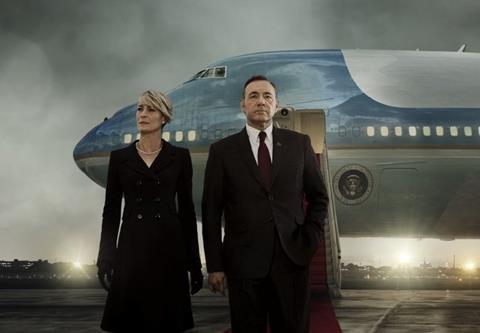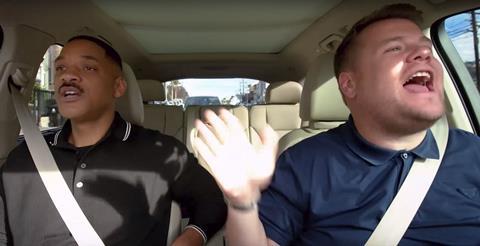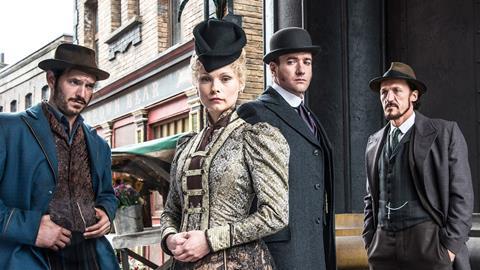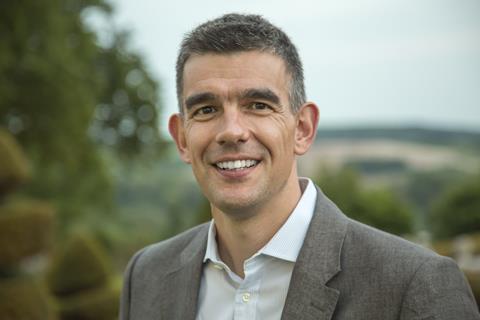Trends that have been emerging for years took effect this year, as traditional broadcasters responded to the threat from Facebook, Apple, Amazon, Netflix and Google through increased collaboration, consolidation and direct to consumer offerings, writes Kate Bulkley.
The saying goes that change always takes longer than expected to arrive but when it does, it comes with a bigger bang than originally anticipated.
And so it has been for television and broadcasting in 2017; many of the trends we have been watching grow for several years, like the rise of subscription on demand services, the rejection by consumers of the big pay TV subscription bundle and the growing appetite for mobile video, have not only arrived but are causing significant and long-lasting impacts on the media landscape.

2017 is pivotal because the Silicon Valley tech giants or FAANG companies – Facebook, Amazon, Apple, Netflix and Google - are now well and truly focused on video, including live broadcasting.
They all see the power of video to attract and hold attention, particularly among the more fickle younger viewers, as well as the advertising money that video attracts.
Meanwhile, traditional broadcasters, led by Disney, Discovery and CBS, have acknowledged the threat and moved more aggressively towards direct-to-consumer services.
In the wake of the consumer rejection of big bundle pay TV services, particularly in the more mature US market, the biggest media companies out there are re-thinking strategic plans.
Speaking at an industry event in November, CBS Chief Executive Les Moonves summed it up: “We’re competing against monstrous companies.
“Disney is six times as big as we are. Comcast is six times as big as we are. Netflix market cap is huge. Now Amazon, the number one company in the world, is producing content,” said Moonves.
“We’re sort of like an old-fashioned production company. We’re a small guy. Eventually are we going to need to do partnerships with other content companies and distribution companies? The answer is probably yes.”
Next week The A-Z of everything that happened in the world of cinema in 2017
No wonder the mergers and acquisitions market as well as the collaboration market have ramped up.
In the shadow of FAANG, scale is now seen as one way to counter the clout and deep pockets of Silicon Valley.
Meanwhile, the embracing of mobile video continues to grow with three quarters of all mobile traffic predicted to be video by 2023, according to a recent study from Ericsson.
Diversification was also on broadcasters’ agendas, including moving more rapidly into digital products and distribution.
Scandinavian broadcaster Modern Times Group continues to leverage its position in the rapidly developing eSports business and in digital distribution so that by the end of 2017 some 34% of its sales came from its digital businesses.
Fake news phenomenon
All this in a year that also saw the rise of “fake news” and disturbing revelations about alleged sexual harassment in the TV and film business rocked the media business.
Aided and abetted by self-proclaimed populist US President Donald Trump, “fake news” has become a serious issue for legitimate news outlets, not to mention democracy.
The ire that President Trump holds for CNN has gone so far as to impact the ability of its owner Time Warner to sell to AT&T without first spinning off the “offending” unit.
Code of conduct
The alleged sexual harassment, assault and rape by Hollywood mogul Harvey Weinstein revealed in early October has moved far beyond being an isolated incident, snowballing into an avalanche of allegations against others from NBC’s News Matt Lauer to Public Service Broadcasting’s Charlie Rose to head of Amazon Studios head Roy Price.

The allegations have rocked the TV and film business, derailing production schedules as well as awards shows, for example, causing the International Academy of TV Arts & Sciences to drop plans to honour Kevin Spacey, the star of Netflix’s House of Cards, after separate allegations emerged against him.
In the wake of these, Netflix first suspended production on season six of its House of Cards original, then announced the that it would no longer work with Spacey on this or any other Netflix production, casting doubt over if the actor’s character would even appear in what will be the last of the series next year.
Committed to content
But what is clear is Netflix’s commitment to continue to ramp up its original content investment – set to top $8bn in 2018, a third more than 2017, with 25% of the money to be spent on original content, including 30 new anime series and 80 original films.
The streaming company has also lured from ABC/Disney hit-maker Shonda Rhimes, who created Grey’s Anatomy and Scandal.
To put all this in perspective, Netflix already outspends rival FX, CBS and HBO, the latter of which spends about £2bn a year on original content. Facebook and Apple have also both become deadly serious about video with Apple announcing its own $1bn move into video programming earlier this year.
It turns out that Facebook Live –where broadcasters were encouraged to use the platform to live stream events - was simply the opening act for a much bigger push by the social media giant into all kinds of video tailored to its various online communities.

Facebook CEO Mark Zuckerberg called out video early in 2017 as the next “megatrend” and started investing in short form content, including 360-degree videos, with the expectation that Facebook will be “mostly video” in the next five years.
Meanwhile, Apple hired big TV names Zack Van Amburg and Jamie Erlicht from Sony Pictures Television and, more recently, Jay Hunt, the recently departed chief creative officer at Channel 4, to lead its reported $1bn charge into video.

The move began with the surprise acquisition in the summer of a 16-part TV series based on the Carpool Karaoke segment of CBS’s The Late Late Show with James Corden.
It may not give Apple the transformational result that the remake of House of Cards did for Netflix back in February 2013, but the guess is that Apple is only getting started.
Among the biggest and most complex of the tech giants is Amazon, which is not only ramping up original content for its Prime Video service but it is also aggressively moving into the TV channel aggregation space, offering pay TV-like subscription services, delivered online, in various countires including the US, UK and Germany.
New business models
This is part of the move to “skinny pay TV bundles” that consumers are demanding. And of course, Google’s YouTube continues to grow exponentially in terms of the amount of content available – some 480 hours of content is uploaded every minute, which is extraordinary, and 60% of that is being watched on a mobile device.
Just like the move to mobile before it, the move to direct-to-consumer services is clear.
It’s taken awhile but now top legacy TV companies are endorsing the Netflix-like strategy as a big part of the future. Traditional broadcasters had given a nod to the SVOD tactic in recent years, but in 2017 there was an all-out rush in that direction.
The parent companies of Hulu – 21st Century Fox, Comcast, Disney and Time Warner – have refocused on the streaming service, which won the first-ever drama series Emmy for a streaming service with The Handmaid’s Tale in September.
Its owners also seem committed to selling their back-catalogue TV shows to Hulu rather than feeding rival Netflix. Starting in 2019, Disney is planning to launch its own stand-alone streaming service and will withdraw its library from Netflix completely.
The threat to the traditional TV funding model also got a lot clearer in 2017.
BBC Director General Tony Hall claims that the pressure that SVOD is causing to the UK’s leading broadcaster is serious.
Shortly thereafter, BBC Worldwide, the commercial arm of the public service broadcaster, announced it would merge with BBC Studios to achieve the scale it needs to compete against FAANG and avoid a mass takeover of the UK market by Netflix and Amazon and others, which are placing uniquely British content “under serious threat,” according to Hall.

He forecast that spending on TV programming in the UK looks set to fall by as much as £500mn over the next decade. “In the UK we often think of the BBC as a big player, but today the media market is truly global,” said Hall.
“And in that vast solar system, we are tiny compared to the huge gas giants of the US And every day they’re getting bigger.”
Strategic compensation
Sky, the most commercial of companies, seems to be looking for help to counter FAANG.
Jeremy Darroch, the CEO of Sky, has called on Europe’s policy makers to ensure a level playing field, saying that license broadcasters are disadvantaged having to compete with global online platforms.
“When paying taxes, employing people and complying with the law are competitive disadvantages, you know that you have a problem,” said Darroch.
“It’s a lop-sided contest and left unchecked, represents a real challenge where European champions and national broadcasters, be they public or private, will suffer. At best, our valued standards of content are being eroded; at worst, fundamentally undermined.”
And adding a nod to TV’s safer environment for advertisers and regulated news services, Darroch added: “At a time when there are serious questions over the veracity, safety and legality of much of the content to be found on the Internet, television remains the gold standard reference point for responsibility.”
Darroch says that Sky’s 22m subscribers across Europe are under threat when Netflix alone is all but matching Sky’s programming spend.
BSkyB spent £7 billion on programming this year, but much of that is on sport in general and English Premier League football in particular.
New entrants with big money
Netflix, by comparison, has spent $7 billion this year on its own content and will increase that to $8 billion in 2018. That will include a staggering 80 new movies in the next 12 months. For contrast, HBO (the leading drama maker in the world) has a $2-3 billion annual budget for its shows.
Producer and head of Sister Pictures Jane Featherstone told the audience at the Bafta TV lecture this year that the power of FAANG to woo producers with large cheques will reduce the number of co-productions with traditional media companies, because FAANG want to produce for their global platforms and keep all the rights.

Partnerships such as BBC and Amazon’s collaboration for Ripper Street will be over in the next 12-18 months, she forecast.
“The honeymoon is over,” was how she described the upcoming phase of the relationships between new and old TV brands.
Less nuanced programming, less regional tastes and more content that works on a global scale is what the likes of Netflix prefer, she warned.
In light of these changes, broadcasters are looking to collaborate more to compete more effectively with FAANG and to keep up with changing consumer demands.
For example, as younger audiences bleed away from traditional linear TV broadcasting for streaming services, broadcasters are upping their catch-up and on demand services, collecting data to better understand what audiences want.
The FAANG impact on traditional broadcasters
Content alliances are also on the rise with ITV and Channel 4 and Sky even talking about co-producing together, certainly a first for the rival broadcasters. Taking a leaf out of the Hulu playbook, the BBC and ITV have formed Britbox, an SVoD service in America to highlight its best programmes.
Traditional documentary makers like Nat Geo and Discovery are expanding their content in an effort to be a more effective combatant in the FAANG content wars.
Nat Geo has moved into premium scripted drama based on true events including Mars and Genius, while Discovery has moved into live sports, buying the rights to the Olympics for its Eurosport channel and app, as well as spending $14.6bn to buy Scripps Interactive Networks, the owner of niche channels like HGTV and the Food Network, so that they can develop more “super fan” content where they own all the rights for every distribution platform.

In the case of advertising, broadcasters are also teaming up to create better offers for advertising clients who in an era of continuing media consumption fragmentation, are demanding that broadcasters offer more effective targeting for their advertisements.
Channel 4 has joined up with Germany’s ProSieben, Italy’s Mediaset and France’s TF1 to develop a pan-European, digital advertising sales team that is especially focused on attracting money for the 16-34-year-old viewers who are drifting to the SVOD services.
Meanwhile, Former Sony Chairman Howard Stringer along with longtime TV distributor Jeremy Fox and the Modern Times Group Head of Programming and Content Development Jakob Mejlhede launched Atrium TV earlier this year, a drama financing club for OTT and SVoD projects to help broadcasters cobble together budgets big enough to compete with the deep pockets of the global digital platforms.
Just how the allegations of sexual harassment will affect the long term prospects of the industry is unclear, but the threat from FAANG is real and it’s here to stay and now it seems, everyone knows it.
Of course, not all the moves the FAANG make work perfectly.
Facebook has faced a backlash for enabling fake news on its site and has begun to take more proactive action in that regard, while Google’s YouTube has come under fire for playing host to, and in some instances making ad revenue from, extremist content as well as monetised videos that “exploit young children and appeal to paedophiles”.

The platform is taking steps to control the “bad actors” on its site and make sure they cannot monetise their activities, says Matt Brittin, Head of Business and Operations for Google EMEA.
At an RTS event in November Brittin threw down the gauntlet to the TV industry, calling it “wonderful” but also “incredibly inward looking”.
He urged the TV industry to watch what consumers are doing more and to “experiment with different platforms and technologies,” including YouTube.
When asked if he saw all TV going to IP /streaming eventually he said without hesitation, “Yes, of course.” Maybe this was the most significant moment of the year because it encapsulated the changes that are taking place on a scale that both the traditional and new-style content companies now truly understand.
























No comments yet